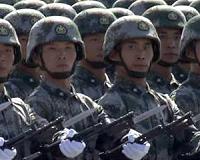| . |  |
. |
Washington (AFP) Jan 7, 2011 Defense Secretary Robert Gates hopes to defuse tensions with China's growing military when he visits Beijing next week in the latest US bid to forge a security dialogue with the country's sceptical generals. The trip, to include a tour of a nuclear weapons command center, carries hefty symbolism, with military relations marred by recurring strains and Washington increasingly impatient with Beijing's stance toward North Korea. After three days of talks in China, Gates heads to Tokyo on Wednesday and Seoul on Friday for meetings focused on the volatile crisis on the divided Korean peninsula. With Chinese President Hu Jintao due in Washington for a pivotal state visit on January 19, both sides are anxious to show progress in defense ties, which China has repeatedly suspended over US arms sales to Taiwan. "This was something the Chinese very much wanted to do in advance of that trip (by Hu). They want to get this relationship back on track and working in a positive direction," Pentagon spokesman Geoff Morrell said Friday. The visit comes a year after Beijing broke off military relations in protest against a multibillion-dollar arms package for rival Taiwan. Gates embarks on the journey "encouraged" and "optimistic" that military relations can be placed on a more solid foundation, said Morrell, but he acknowledged that previous efforts have produced only fleeting progress. Days before the US defense chief's trip, photographs appeared showing a prototype of China's first stealth fighter, the J-20, at an airfield in the southwest. The images of the fighter jet coincide with mounting concerns in the Pentagon about China's increasingly assertive and capable military, including the development of anti-ship missiles that could undercut America's navy. Although China may be years away from fielding fully-capable anti-ship missiles or warplanes to rival US fighters, analysts say it is steadily gaining ground. In his first visit to China since 2007, Gates is scheduled to hold an array of meetings with top officials, including his counterpart, General Liang Guanglie. On Wednesday Gates will visit the army's Second Artillery Corps headquarters outside of Beijing, which is China's nuclear command center. The United States has long sought to open up regular discussions with the Chinese on nuclear, space and cyber weaponry, and by talking to officers overseeing the atomic arsenal, Gates hopes to lay the groundwork for such a dialogue, officials said. Aware of the Asian juggernaut's rise, the United States for years has appealed to China to back a more "durable" dialogue -- similar to US-Soviet exchanges during the Cold War -- to avoid miscalculations. But China has instead opted to sever ties in order to register its displeasure with Washington, particularly over billions of dollars in weapons deals to Taiwan. "They will probably have some strong words about future arms sales to Taiwan," said June Teufel Dreyer, an expert on the Chinese military and a professor at the University of Miami. Because China senses its economic and military might expanding, Gates will not be in a strong negotiating position, she told AFP. "He will be perceived as begging to get the military relationship back on track, enabling Beijing to ask 'what do we get out of this?'" Pentagon officials insist Gates is not out to plead with China. "China will need to buy into the framework and the logic we see for the military-to-military relationship for its own reasons and in pursuit of its own interests, not because we ask them to," Michael Schiffer, deputy assistant secretary of defense for East Asia, said in a speech Thursday. China's fast-growing military will also be on the agenda when Gates travels to Japan on January 13-14, where he will hold talks with Defense Minister Toshimi Kitazawa. Tokyo last month announced a shift of strategy in which it would bolster its defenses in the south to address concerns about China's armed forces as well as the threat posed by North Korea. On Friday, Gates makes a brief stop in Seoul to discuss how to prevent tensions from escalating with North Korea in meetings with South Korean President Lee Myung-bak and the new defense minister, Kim Kwan-jin. "China has a very important role to play here as well, to get Pyongyang to understand that its current course and its current behavior is extraordinarily dangerous and destabilizing," said a senior defense official, who asked not to be named.
Share This Article With Planet Earth
Related Links Learn about the Superpowers of the 21st Century at SpaceWar.com Learn about nuclear weapons doctrine and defense at SpaceWar.com
 US cannot accept China military power: state media
US cannot accept China military power: state mediaBeijing (AFP) Jan 7, 2011 China will eventually have a military powerful enough to compete with the United States, state media said Friday ahead of the visit of US Defence Secretary Robert Gates. The claim in a newspaper editorial followed reports that China had completed a prototype of a stealth fighter and after a top US military official said Beijing was stepping up efforts to deploy a "carrier-killer" missile sys ... read more |
|
| The content herein, unless otherwise known to be public domain, are Copyright 1995-2010 - SpaceDaily. AFP and UPI Wire Stories are copyright Agence France-Presse and United Press International. ESA Portal Reports are copyright European Space Agency. All NASA sourced material is public domain. Additional copyrights may apply in whole or part to other bona fide parties. Advertising does not imply endorsement,agreement or approval of any opinions, statements or information provided by SpaceDaily on any Web page published or hosted by SpaceDaily. Privacy Statement |